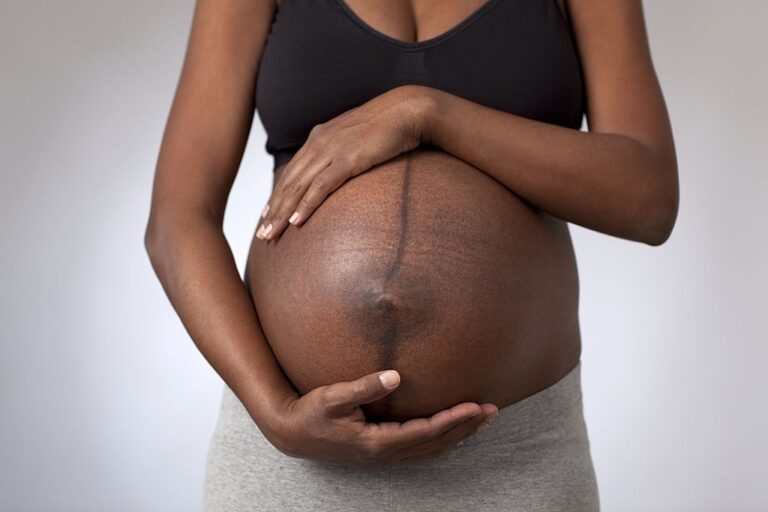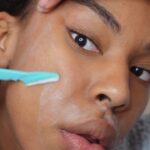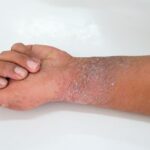Pregnancy is a beautiful time in a woman’s life, as her body adjusts to bring forth new life, and there are several changes that occur within a woman’s body during this period. Many of these physiological and hormonal changes will affect every part of her life, from her habits, diet and the size of clothes that she wears to the state of her skin and hair.
How does pregnancy affect the skin and skincare?
Pregnancy can lead to several changes in the skin like stretch marks, varicose veins, acne, skin tags, melasma or hyperpigmentation, prurigo of pregnancy, and other conditions. These conditions span across nationalities, and are not peculiar to any race of women. However, women of color are more liable to notice those ones that involve darkening of skin, hyperpigmentation or discoloration.
Asides the fact that pregnancy brings about changes to the skin, it can also influence the kind of skincare to be used. Expectant mothers have to stay away from a lot of things and chemicals as soon as they discover their condition. Unfortunately, some skincare products happen to be among that long list; especially the ones that contain certain chemicals that may be harmful to pregnant women and their growing children. Our top 5 harmful skincare ingredients include:
- Formaldehyde
This chemical is not commonly used in skincare anymore, but formaldehyde-releasing chemicals such as DMDM hydantoin, bronopol and diazolidinyl urea are frequently used in cosmetics. These compounds are very dangerous to pregnant women may possibly lead to miscarriage and in severe cases, infertility.
- Salicylic acid
High- dose salicylic acid is very harmful to pregnant women, and this chemical compound can be found in many acne creams, oral medication and peels. Due to the fact that pregnancy can lead to acne, some pregnant women may be at risk of using those kinds of skincare products. High-dose salicyclic acid should, however, be avoided at all costs. Certified obstetricians and gynecologists may prescribe products with lower doses of salicylic acid – which may not be harmful to pregnant women – to help expectant mothers with the removal of acne.
Another alternative would be for pregnant women to use gycolic acid to treat acne, although this chemical too can be harmful to them in large amounts.
- Retinoids
Vitamin A is an essential nutrient which is needed for proper eye health, reproductive health, good skin and immunity. The body converts this important vitamin to retinol in order to perform all those functions. A form of retinol, called retinoids, is also good for the treatment of acne and the reversal of signs of aging. However, retinoids pose a considerable risk of birth defects in pregnant women, when absorbed by the body in high doses; and so, pregnant women must stay away from them.
- Phthalates
These chemicals are endocrine-distruptors which are present in personal products and beauty products. Although, very few studies can prove it, phthalates may play a role in severe hormonal and reproductive dysfunction. These may be particularly harmful to pregnant women.
- Oxybenzone
Although it has not been scientifically proven based on human studies, Oxybenzone is quite effective as sunscreen, however, various studies based on animal testing have shown that this chemical may lead to some damage to pregnant mothers and their children.
Nevertheless, severe exposure to the sun itself remains a critical factor of skin damage. Besides the fact that it can cause sun burn, hyperpigmentation and skin cancer, sun damage – or even severe sun exposure – may also increase the rate of progression of other skin conditions like dry skin and melasma. And so, pregnant women should avoid severe sun exposure.
As a matter of fact, pregnant women may be more sensitive to the sun, due to higher levels of hormones. This may make them more prone to all the effects of sun exposure and sun damage. So, when they do have to socialize in the sun, they must remember to hydrate, moisturize and cover up.
Also, drugs and medications that can increase sun-sensitivity (like decongestants, drugs for cancer, diabetes medications, antibiotics, retinoids and other drugs for the treatment of skin conditions, diuretics, psychiatric drugs, pain relievers and hormones) should be avoided by pregnant women, except those ones that have been prescribed for them by certified OBGYNs.
How does pregnancy affect the hair and haircare?
Pregnancy can lead to several changes in the hair as well. The most common effect of this precious period on women’s hair is increased hair growth, due to hormones. Various studies show, however, that this increased hair growth will only last for as long as those pregnancy – and breastfeeding – hormones continue to flow thorough the woman’s body, and hair loss may follow as soon as that stops. Like with the skin conditions, increased hair growth during pregnancy is not peculiar to any specific race and it spans across nationalities. The opposite effect may also happen to a woman’s hair during pregnancy.
Hair loss due to hormonal shifts, particularly during the first trimester of pregnant, or a condition known as telogen effluvium affects a smaller percentage of women globally, compared to the condition of increased hair growth. However, as the pregnancy progresses and the pregnant woman becomes accustomed to the hormonal changes going on in her body, this condition may reduce or completely disappear. Later on, increased hair growth may even set in.
Some chemicals present in hair products like dyes, straighteners, perming agents, shampoos, and conditioners – even in leave-in conditioners, which are more frequently used by women of color – such as salicylic acid, phenylenediamine, ethanolamine, aminophenols, and ammonium thioglycolate may also be harmful to pregnant women, and may put their children at risk for deformities and health problems.
Additionally, excessive exposure to sunlight during this period may lead to hair damage; although, this risk is also present in women who are not pregnant, as UV rays from the sun may lead to hair breakage, resulting from the breakdown of keratin in hair strands. Pregnancy, however, has been proven to increase sun-sensitivity in women, and this may extend to the state of their hair (even though, there are not many studies about that).
In conclusion, pregnant women should try as much as possible to avoid dangerous chemicals in skin and hair care products during the duration of their pregnancy, and breastfeeding. Some can even decide to go the natural route, as this may be the much safer choice. Also, excessive exposure to sunlight may worsen certain conditions which may occur as a result of pregnancy, particularly in women of color, and this should be avoided.



